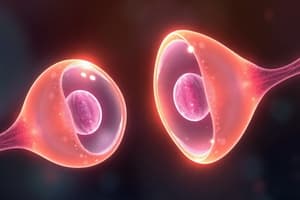Podcast
Questions and Answers
What is the main difference between sexual reproduction and asexual reproduction?
What is the main difference between sexual reproduction and asexual reproduction?
What are the specialized cells produced in sexual reproduction called?
What are the specialized cells produced in sexual reproduction called?
What is the purpose of meiosis in sexual reproduction?
What is the purpose of meiosis in sexual reproduction?
Which process results in the halving of chromosome number in gametes?
Which process results in the halving of chromosome number in gametes?
Signup and view all the answers
What happens during fertilization in sexual reproduction?
What happens during fertilization in sexual reproduction?
Signup and view all the answers
What is one advantage of sexual reproduction mentioned in the text?
What is one advantage of sexual reproduction mentioned in the text?
Signup and view all the answers
How does sexual reproduction help in eliminating deleterious genes within a population?
How does sexual reproduction help in eliminating deleterious genes within a population?
Signup and view all the answers
What is a drawback of sexual reproduction mentioned in the text?
What is a drawback of sexual reproduction mentioned in the text?
Signup and view all the answers
How does meiosis contribute to genetic diversity in sexual reproduction?
How does meiosis contribute to genetic diversity in sexual reproduction?
Signup and view all the answers
What role do specialized males and females play in sexual reproduction?
What role do specialized males and females play in sexual reproduction?
Signup and view all the answers
Study Notes
Reproduction in Organisms: Exploring Sexual Reproduction
Reproduction is a fundamental process that allows organisms to create new individual members of their species. Within the realm of reproduction, organisms exhibit various strategies, and today, we'll focus on one of these strategies: sexual reproduction.
Sexual Differentiation
Sexual reproduction occurs when two genetically different individuals, a male and female, contribute genetic material to produce offspring. In many species, this is evident through the development of distinct sexes, or sexual dimorphism, in which males and females have unique physical structures.
Gametes
In sexual reproduction, specialized cells called gametes are produced. Females produce eggs, or ova, and males produce sperm, or spermatozoa. These gametes contain half of an organism's genetic information, with each gamete receiving one set of chromosomes from their parent.
Meiosis and Fertilization
The production of gametes involves a process known as meiosis, which results in the halving of chromosome number in haploid gametes. This process allows for genetic variation and new combinations of traits in offspring. Fertilization occurs when a gamete from each sex (an egg and sperm) fuse, creating a diploid zygote, which contains the full complement of genetic information.
Fertilization and Development
Sexual reproduction through fertilization allows new organisms to inherit genetic material from both parents. Fertilization can occur internally or externally depending on the species. The zygote develops through multiple phases, with cells dividing and specializing to form a multicellular organism.
Advantages of Sexual Reproduction
Sexual reproduction has several advantages for organisms:
- Generation of genetic variation: Meiosis, through the random assortment of chromosomes, creates offspring that display a genetic mix from both parents, enhancing their ability to adapt to their environment.
- Formation of distinct sexes: Sexual reproduction allows for a division of labor, with specialized males and females that focus on producing gametes and protecting their offspring, respectively.
- Greater resistance to deleterious genes: Sexual reproduction can help to eliminate or minimize the frequency of deleterious genes within a population, as only healthy and fit individuals are more likely to reproduce and pass on their good genes to their offspring.
Drawbacks of Sexual Reproduction
Although sexual reproduction offers several advantages, it also has some potential drawbacks, such as:
- Greater time and energy investment: Sexual reproduction requires a more extensive investment of time and energy, as it involves the production of gametes, fertilization, and development.
- Dependence on a mate: Sexual reproduction relies on the availability of a mate, which can pose challenges for organisms in environments with limited availability of a suitable partner.
In conclusion, sexual reproduction is a vital process that allows organisms to create genetically diverse offspring, which enhances their ability to adapt and survive. Through meiosis, fertilization, and development, sexual reproduction generates a new generation with unique genetic combinations, ultimately contributing to the evolution and survival of species.
Studying That Suits You
Use AI to generate personalized quizzes and flashcards to suit your learning preferences.
Description
Delve into the intricate process of sexual reproduction, focusing on the production of gametes, meiosis, and the generation of genetic variation. Learn about the advantages and drawbacks of sexual reproduction for organisms.




